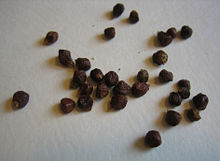Aframomum melegueta
|
Aframomum melegueta grains of paradise |
|
|---|---|
 |
|
| Scientific classification | |
| Kingdom: | Plantae |
| (unranked): | Angiosperms |
| (unranked): | Monocots |
| (unranked): | Commelinids |
| Order: | Zingiberales |
| Family: | Zingiberaceae |
| Genus: | Aframomum |
| Species: | A. melegueta |
| Binomial name | |
|
Aframomum melegueta K. Schum. |
|
| Synonyms | |
|
Amomum melegueta |
|
Amomum melegueta
Aframomum melegueta is a species in the ginger family, Zingiberaceae. This spice, commonly known as ossame, grains of paradise, Melegueta pepper, alligator pepper, Guinea grains, fom wisa, or Guinea pepper, is obtained from the ground seeds; it imparts a pungent, peppery flavour with hints of citrus.
Although it is native to West Africa, it is also an important cash crop in the Basketo district (Basketo special woreda) of southern Ethiopia. The Pepper Coast (or Grain Coast) is a historical coastal region named after this commodity.
A. melegueta is a herbaceous perennial plant native to swampy habitats along the West African coast. Its trumpet-shaped, purple flowers develop into 5- to 7-cm long pods containing numerous small, reddish-brown seeds.
The pungent, peppery taste of the seeds is caused by aromatic ketones; e.g., (6)-paradol (systematic name: 1-(4-hydroxy-3-methoxyphenyl)-decan-3-one). Essential oils, which are the dominating flavor components in the closely related cardamom, occur only in traces.
The stem at times can be short and usually shows signs of scars and fallen leaves. The average leaves are usually 35 cm in length and 15 cm wide, with a well-structured vascular system. The flowers of the herbaceous plant are described as "handsome" aromatic, with an orange-colored lip and rich pinkish-orange upper part. The fruits contains numerous, small, golden red-brown seeds.
Melegueta pepper is commonly used in the cuisines of West and North Africa, where it has been traditionally imported by caravan routes through the Sahara desert, and whence they were distributed to Sicily and the rest of Italy. Mentioned by Pliny as "African pepper" but subsequently forgotten in Europe, they were renamed "grains of paradise" and became a popular substitute for black pepper in Europe in the 14th and 15th centuries. The Ménagier de Paris recommends it for improving wine that "smells stale". Through the Middle Ages and into the early modern period, the theory of the four humours governed theorizing about nourishment on the part of doctors, herbalists and druggists: in this context, John Russell characterized grains of paradise, in The Boke of Nurture as hot and moist.
...
Wikipedia
